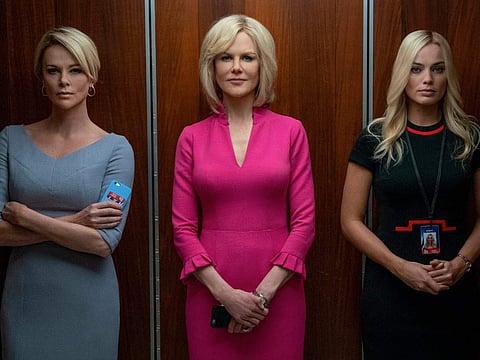

I have always found certain reactions to sexual harassment stories disturbing. Here are some. "She got that job, didn’t she? What’s she complaining about?" Or "But it happened so many years ago, why complain now?" Or "She should have just slapped him and walked out, that’s what I would have done." And then, there’s the icing on the cake: "With those clothes and makeup, what did she think was going to happen?" The truth is, nothing absolves a perpetrator of sexual harassment. But yes, this is a conversation that needs to be spoken with a lot of nuance. It is this dialogue that Bombshell, a film on the Fox News Scandal, directed by Jay Roach, written by Charles Randolph, and starring Nicole Kidman, Charlize Theron land Margot Robbie, presents in all its pragmatic glory.
Here is some context. Gretchen Carlson (played by a strong and steely Nicole Kidman) slaps a sexual harassment case on the then-Fox News president Roger Ailes. She eventually finds support from other women, most notably Megyn Kelly, Fox News’ star anchor at that period. The tussle finally leads to Ailes being kicked out by Rupert Murdoch, and the survivors reaching a financial settlement with Fox News, with Murdoch himself stepping in as the interim chief. While Kidman and Theron reprise real-life characters, Robbie plays Kayla Pospisil, a fictionalised evangelical millennial shaped on the basis of multiple accounts.
Bombshell peels away the top layer to gives us a look into the systemic sexism that prevailed in Fox, and of how it was normalised. It was usual business for Ailes to ask female talent to give him a twirl so that he could see their legs. “It is a visual medium” is the refrain that accompanies this ‘appraisal’. It was normal for Ailes to say, “I need you in a shorter dress”, or to barge into a newsroom and scream, “Wide, wide shot” so that the camera could capture the legs of the anchor. As Megyn Kelly says, there’s a reason behind those clear desks. And a camera specifically designated for the female anchor’s legs has somehow been woven into the fabric of their culture. Why do women choose to be part of this, you might ask. “I just wanted to be on television,” says Megyn. “It is the only job I have ever wanted,” says Kayla. The most honest reply, however, comes from the closeted Democrat, Jess Carr (Kate McKinnon). “I applied everywhere and this is what I got. And even now, I try other places but they don’t take me because I’m from Fox.”
The pragmatism in Bombshell is what makes it stand out. Gretchen doesn’t file a lawsuit because she wants to be a crusader for womens’ rights. People might call her the ambitious woman who sues because her career stalled, but she doesn’t care. Megyn faces a series of questions before she decides to speak up. “If I speak up, then I become the weak one. I don’t want to be defined by Roger’s nonsense,” she says. She even speaks about how she has now come to like Roger, “He looked past the rejection, past the risk of me talking out, and gave me power to hurt him.” But it disturbs her that this behaviour has gone so far unchecked. You see it when the investigator asks her about long-term consequences, and she realises she is the 23rd woman to come forward. “I’ll either be damned for speaking, or be damned for not speaking sooner,” she observes later. There's a lot of reality shown in this thorough exploration of human behaviour. People spill out of the boxes of political correctness more often than not, but it is something that we rarely see on screen with such clarity
This is why Bombshell isn’t exactly a straight-forward tale of sisterhood. Both Megyn and Gretchen are wary of each other -- there’s professional rivalry, ego, and ambition that makes them look at each other with suspicion. As Megyn talks to Kayla, she says she is “consistently fascinated by who history chooses to do something important.” But there’s also a thorough understanding of what runs in the mind of the other woman. This is a bond that isn’t forged through camaraderie, but one that begrudgingly stems from competition and shared experiences. It is an equation that stems from understanding the need to nurture ambition and to survive.
It is easy to ostracise these women for being complicit in the entire scheme of things. After all, these women aren’t ideal heroes. Ailes isn't made out to be a single note villain; he keeps terminally ill staff on pay roll. Several reviews have observed the importance of casting names like Theron, Kidman, and Robbie in making us root for them, setting aside their problematic personal politics. But nothing absolves harassment. To quote Megyn, “You don’t have to like me, all I want you to do is to believe me.” And that’s the thought that triumphs.